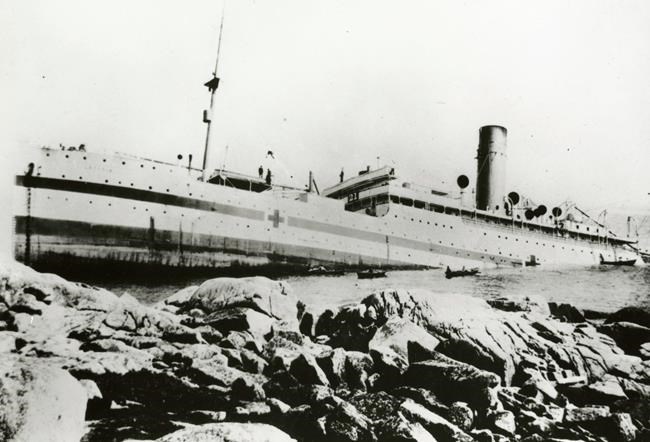
The hospital ship SS-Letitia is shown in a 1917 handout photo. Hundreds of wounded Canadian soldiers were rescued 100 years ago today after their hospital ship ran aground off Halifax harbour.The SS-Letitia was carrying 546 First World War soldiers when it ran aground in thick fog on August 1, 1917. THE CANADIAN PRESS/HO-Marine History Collection, Nova Scotia Museum MANDATORY CREDIT
Republished August 01, 2017 - 12:27 PM
Original Publication Date August 01, 2017 - 8:01 AM
HALIFAX - The SS Letitia was cutting through thick fog, its crew preparing to unload hundreds of wounded Canadian soldiers in Halifax's busy harbour, when the captain stepped onto the deck and saw a dark shadow looming.
Capt. William McNeil knew instantly that the hospital ship, with its 546 injured soldiers and 137 crew, was heading directly into one of the treacherous shoals that line the entry way to the harbour.
He immediately ordered the ship full astern, hoping to prevent it from crashing into the rocks that were quickly coming into view.
But the order came too late — the momentum propelling the 473-metre vessel grounded it on a cluster of rocks near Portuguese Cove at about 10:30 a.m. on Aug. 1, 1917.
The lesser-known incident, thought to be the result of poor navigation by a pilot brought on board about 10 minutes before the crash, was being remembered Tuesday — the 100th anniversary of an accident that miraculously claimed only one life.
Roger Marsters, curator of marine history at Halifax's Maritime Museum of the Atlantic, said the vessel was on the final stretch of an uneventful transatlantic journey when the wrong course was conveyed to the ship's master as fog horns and bells rang around them.
As soon as it crashed, he said the captain issued requests for help from nearby minesweepers and boats, which were dispatched to pick up the soldiers injured during the First World War. They were headed to Pier 2 for treatment at a convalescent hospital, or to be sent home.
"It seems quite spectacular in retrospect," he said. "In an age where there were a lot more vessels on the oceans, dramatic rescues like this were much more common than they are today."
Several members of the crew stayed on board after the passengers were removed, but abandoned the Scottish-registered vessel when it became clear it suffered too much damage to be salvaged.
The one person to die was a stoker who had taken a nap during the rescue operation and decided to swim to shore when he woke. He drowned as the vessel floundered on the rocks.
The wreck split in half months later, with her stern section sinking in deeper water. A museum web site says salvagers and looters removed much of her equipment, but she remains a popular dive site.
A transcript from a hearing by the Wreck Commissioner's Court that looked into the crash includes testimony from McNeil and his recollection of an exchange with the pilot moments after the collision.
"I said when I went up, 'Well you have done it now,'" the veteran 55-year-old captain stated. "He said, 'Well yes sir, it is too bad to think that you should bring your ship all the way across and me put her ashore here.' He seemed very sad about it."
Marsters said the pilot was sanctioned, and the misstep likely hindered his future advancement.
"An accident like this in the immediate approaches to the harbour surely would have been embarrassing, let's say," he said with a laugh. "It wouldn't have been good for his career prospects."
The museum has a collection from the Letitia, including pictures, a model of the vessel and artifacts like a napkin ring, desk calendar and menu.
Marsters said it's an important piece of maritime history and sets itself apart from other disasters, like the Titanic and SS Atlantic, which saw high casualties.
"This is a consequence of Halifax being one of the most important ports in the world during the First World War," he said. "Not everyone died, which is something we should highlight since we have so many grim stories here and it's good to have one where the ending is mostly happy."
News from © The Canadian Press, 2017